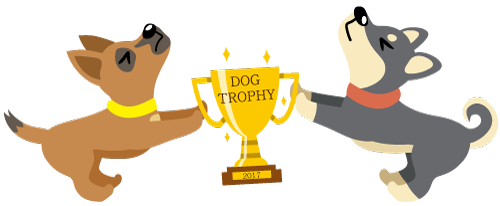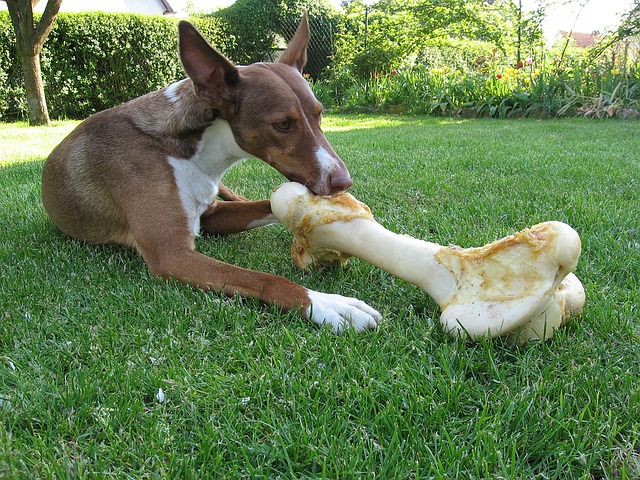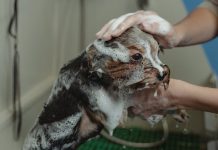Can dogs eat bones? Dogs is allowed to eat bones, but not any kind. Do you know or roll with your eyes because ‘it is known’ that bones are dangerous (and in fact, they are not, but – it depends) or you know that fresh bones are healthy and useful for dogs, but you are terribly bothered because there is talk.
Experienced ‘raw feeders’ know that bones are an important part of a dog’s overall diet, but with a few important notes and warnings.
Bones are an important source of calcium and phosphorus
First of all, bone and cartilage are an excellent and perfectly available source of calcium, phosphorus, and glucosamine (especially in cartilage). Raw meaty bones are an integral part of the fresh raw diet for dogs, so the most commonly recommended are chicken back, wings and neck, chicken legs, as well as turkey neck, beef and pork ribs, lamb, beef tail, back, etc.
How dogs chew bones
The ideal choice of bone depends on the size of the dog, but also on the way the dog eats the bones, so the choice should be adjusted and experimented with. The dog will generally ‘grind’ the bone vigorously several times and swallow it. It is always wise to monitor the dog while eating the bone, so if you notice that he is swallowing too large pieces, take the bone away from him and try another type of bone.
If he happens to swallow a larger piece or part that he cannot digest, as a rule, he simply vomits it. Don’t overdo it in quantity, you will know it’s too boney when a dog’s stool is white and dry, like chalk.
5 important rules when giving bones
1. Exclusively fresh and raw
Give the dog only fresh, raw bones. The dog can digest FRESH AND RAW bones without any problems and make them pliable and soft thanks to digestive juices. BUT stomach acid needs to be around 2 pH for this to be possible! This is usually the pH level of a dog that is on a raw diet, without a large proportion of carbohydrates (except for some vegetables, vegetables, etc.).
So if by any chance your dog is on dehydration or you are mixing dehydrate and raw meat, BETTER DO NOT give the dogs to eat bones as they will most likely not be able to digest them safely given that his stomach acid is not acidic enough!
2. Never heat treated and dehydrated
Never, but NEVER give a dog boiled, baked, smoked, or dried bones as they can be very dangerous, sharp, indigestible, and can mechanically injure the dog’s gastrointestinal system. The bone must be exclusively fresh.
3. Stay away from hard femurs
Avoid large, extremely hard hair such as e.g. femur (femur) since dogs can damage their teeth. Simply because they are too hard. Especially for dogs that savagely and ‘greedily’ attack the bone.
Also, avoid sagging femurs for the same reason. Cook them together with the marrow and make soup from the bones. Then toss the bones and add the soup to the meals. Bone broth is a real balm for permeable intestines.
4. Never smoked and sterilized
Never give a dog sterilized, smoked, dried bones from pet shops because they are just as dangerous as other heat-treated bones.
5. Throw ‘bones’ of leather freely in the trash
There is a special circle of hell for the producers and sellers of a super toxic product called ‘rawhide’, which uses a bunch of chemicals, dyes, glues, additives, and chlorine. Never give it to a dog. This is this in your photo.
A few more important notes:
– Bone marrow is terribly fatty and can cause an acute attack of gastritis in dogs.
– Buy bones (and meat) from a reliable butcher. Such a proven and safe way of keeping products of animal origin intended for human consumption is generally a guarantee that the meat and bones are OK.
– I do not recommend buying meat and bones in supermarkets because they are often treated with chlorine, but if you have no other option, choose carefully and control the expiration date on the packaging.
– Fresh bones (and meat) naturally contain bacteria that dogs with the above-mentioned pH 2 can very successfully ‘master’ and neutralize, and you regularly wash your hands, bowls, and surfaces where the dog consumes raw food, preferably with harmless organic and biodegradable detergent and with an excellent natural disinfectant – white alcoholic vinegar.





